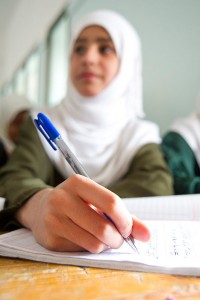Research & Adaptive Programming Needed to Support Learning in Conflict, say Experts at CIES
This piece originally appeared on the Creative Associates International website on March 11, 2016. It has been cross-posted with persmission.
 When a U.S. student returns from a typical summer break, she has lost nearly one month of learning due to the gap in instruction. When a student in Yemen or Nigeria is out of school for months or even years as a result of conflict, the learning loss is compounded exponentially by severe trauma and transition.
When a U.S. student returns from a typical summer break, she has lost nearly one month of learning due to the gap in instruction. When a student in Yemen or Nigeria is out of school for months or even years as a result of conflict, the learning loss is compounded exponentially by severe trauma and transition.
“The research on learning loss is really based heavily in domestic [U.S.] education and is also fairly constrained to a [summer] gap. But as we move to conflict, we know there are a lot of other aspects that inhibit or constrain learning,” said Eileen St. George, Director of Education in Conflict Creative Associates International.
Speaking on a panel on learning loss at the Comparative and International Education Society conference on March 9 in Vancouver, she explained in times of crisis, factors like food insecurity, violence, health risks and trauma experienced by both students and educators affects learning and can exacerbate regular learning loss.
This affects both out-of-school children and children who still manage to attend school amidst the conflict.
“We can’t assume when we get them back in that learning environment that they’re going to be at the same level,” said St. George, noting that providing education under this type of duress calls for specialized interventions.
Educators and program implementers need to find ways to “turn the tide and get [students] to stop the drop in their learning, regain what’s been lost, and hopefully also build the momentum so they can excel,” said St. George.
To continue reading this article at http://www.creativeassociatesinternational.com/, please click here.



